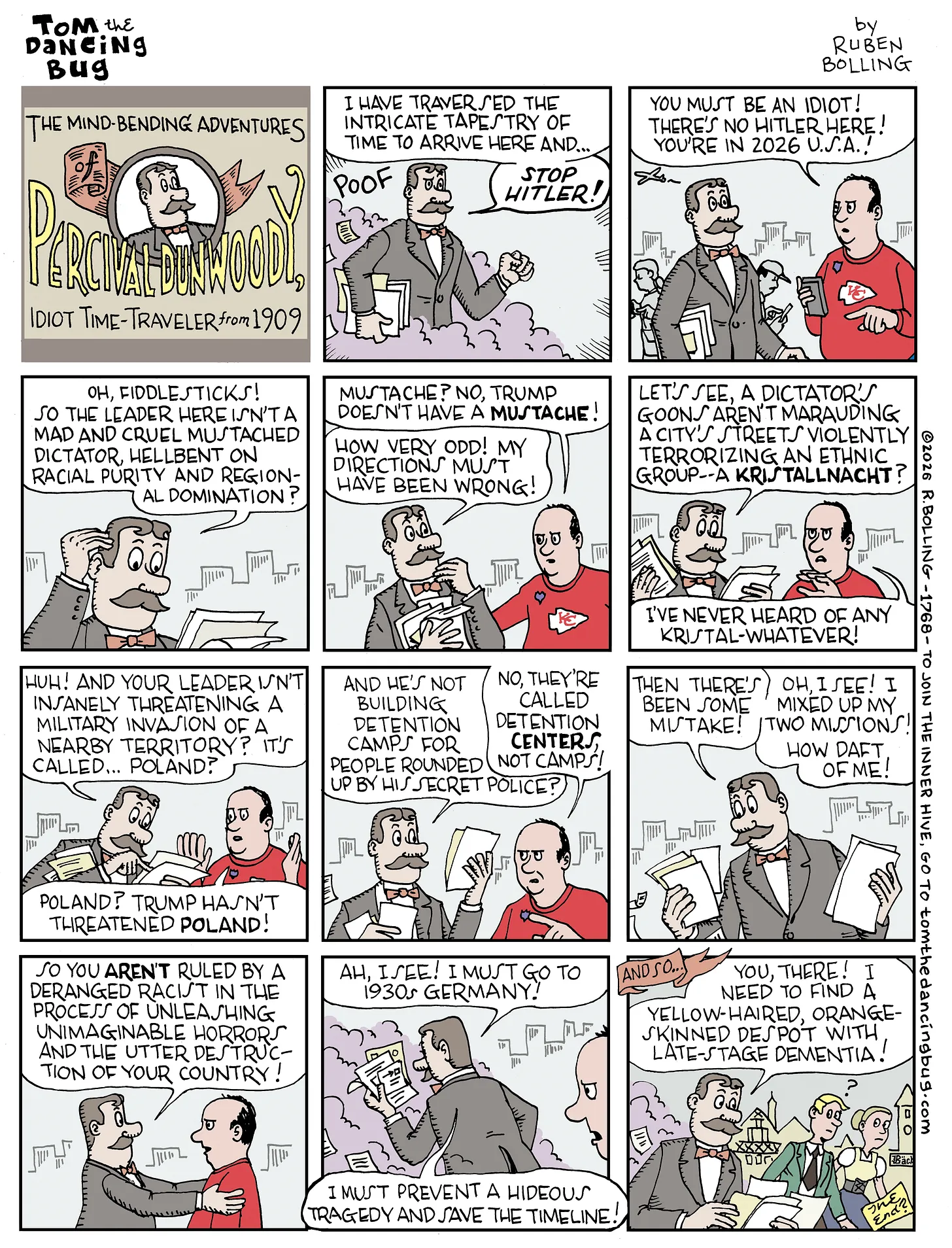I am begging my fellow politicians, my fellow Illinoisans, my fellow Americans to realize that right now in this country we are not fighting over policy or political party. We are fighting over whether we are going to be a civilization rooted in empathy and kindness — or one rooted in cruelty and rage.
- Governor J. B. Pritzker of Illinois
"I Love Illinois. I Love America. I Refuse to Stop."
This week's featured post is "The Tariff Decision".
Ongoing stories
- Trump's assault on American democracy. Ever since the Supreme Court's sweeping and bizarre ruling giving Trump immunity for all "official acts", followed by a series of shadow-docket rulings giving the Trump regime the power to do things that lower courts had deemed illegal, we've had to wonder whether the judiciary is still an independent branch of government. Friday, the Supreme Court asserted its independence by ruling that the majority of Trump's tariffs are illegal.
- Climate change. The EPA has reversed the 2009 endangerment finding that named CO2 as a pollutant that can be regulated. The EPA is now essentially helpless to do anything to combat climate change.
- Gaza. The "Board of Peace" that claims to be overseeing the reconstruction of Gaza includes no Gazans or other Palestinian representatives. But it's building a base to house a multi-national peacekeeping force. Meanwhile, Israel is preparing to expand colonization of the West Bank.
- Ukraine. M. Gessen looks at Ukraine after four years of war, a period longer than Russia and Ukraine experienced fighting the Nazis as part of the Soviet Union. "Now Ukraine’s patriotic war, against Russia, has crossed that threshold, with no end in sight. Russia’s offensive appeared to speed up in December. In February, Ukraine recaptured ground, in its most successful counteroffensive in more than two years. But on the whole, the front line has remained largely static for more than three years."
This week's developments
This week everybody was talking about tariffs
This is covered in the featured post. Short version: The Supreme Court has ruled that the "liberation day" tariffs are illegal. Trump immediately replaced them with 15% across-the-board tariffs, which are almost certainly illegal too.
One additional comment from Paul Krugman: Even if the new tariffs stand up in court "Tariffs as an instrument of arbitrary power have been dismantled." Under this law, Trump can't impose large tariffs on countries he doesn't like and low tariffs on countries that grovel to him.
Something I didn't mention in the featured post is how catty the conservative justices got with each other in their written opinions. For example, Roberts strongly implied that Kavanaugh was simply a Trump mouthpiece:
The Government, echoed point-for-point by the principal dissent, marshals several arguments in response.
and the Epstein files
The big recent news about the Epstein scandal is that other governments are taking it far more seriously than the Trump administration is. The former Prince Andrew, brother of King Charles of the UK, was arrested Thursday morning. The King expressed his "deepest concern" over Andrew, but showed no indication to help his brother in any practical way, saying "the law must take its course".
US Republicans are mostly doing the exact opposite: expressing "concern" over Epstein's victims, but not lifting a finger against the men who abused them.
Andrew was arrested for "suspicion of misconduct in public office". I'm not sure how that correlates to anything in the US justice system. You can't be convicted of "suspicion", but a formal investigation will decide whether a charge will be pressed. Because "misconduct in public office" is such a catch-all term, the penalties range all the way up to life imprisonment. Ultimately, the charges may include not just sex crimes, but also leaking confidential information to Epstein. (Andrew used to be a trade envoy for the UK, so his insider knowledge could be useful to a financier.)
In spite of King Charles revoking Andrew's title in November, for now he remains 8th in the line of succession to the throne. Removing him from succession requires an act of Parliament, which is under consideration.

I can't discuss the Epstein case without mentioning Pam Bondi's shameful testimony to the Senate Judiciary Committee. She responded to virtually every question by yelling attacks at the questioner. Among other questions she dodged in this manner, she refused to comment on why the Justice Department had not talked to any of the Epstein victims who were present in the gallery, and segued onto the high stock market and how we really ought to be talking about that.
Just for the record: The performance of the stock market should never come up during the testimony of an attorney general. Her job has nothing to do with that.

The NY Times Pitchbot skewers both Andrew and the US Supreme Court's decision giving Trump immunity:
"Charges against Former Prince Andrew must be dropped if it’s determined that raping teenagers was an official act." - by John Roberts (joined by Thomas, Alito, Gorsuch, Kavanaugh, and Barrett).
WaPo lists prominent people -- mostly non-US or in the US private sector -- whose connections with Epstein have produced consequences. Notably missing: Commerce Secretary Howard Lutnick.
The commerce secretary previously told Congress he cut ties with Epstein in 2005 after the late financier - a neighbour of Lutnick in New York - used sexual innuendo to explain why he owned a massage table in a room of his home. In Tuesday's testimony, he said: "Over the next 14 years, I met him two other times that I can recall." The justice department files show Lutnick visited Epstein's Caribbean island on 23 December, 2012. That came four years after Epstein was convicted for soliciting prostitution from a child.
Hunting for revelations about the occupant of the Oval Office in this email blizzard is a fool’s errand. Trump’s name attached to anything incriminating is redacted. Of the 5,300 files with 38,000 references to Trump, Melania, or Mar-a-Lago, none are direct communications between Trump and Epstein. Deputy AG Todd Blanche has already said that the second half of the tranche—another two-and-a-half million pages—will never see the light of day.
Nonetheless, people are finding things. Jay Kuo summarizes what he's seen so far. Nothing he mentions constitutes beyond-reasonable-doubt proof. But it's a far cry from Trump's claim "I've been totally exonerated."
Another look at Trump's culpability comes from the NYT.
Celeste Davis wonders about the Epstein-files question hardly anybody asks:
Everyone is asking how did these men get away with so much rape? No one is asking what would cause so many to want to rape so much in the first place?
We seem to take for granted that men whose power puts them beyond any restraints will of course abuse underage girls. Why do we do that?
A. R. Moxon makes a related point not specific to the Epstein story. He comments on the "male loneliness epidemic", which he finds frequently discussed in the media.
This is a problem. What I am inviting you to contemplate is how frequently it is treated as a problem for men, caused by women, to be solved by everyone else. I'm inviting you to contemplate how seldom it's being treated as a problem caused by men who have never even started the work they need to do on themselves.
Moxon traces the "problem" to the decline of patriarchy: Men who expect to dominate a woman domestically and sexually are less and less likely to find a woman who agrees to be dominated.
The loneliness of women—also quite real—is not a problem that's usually mentioned at all, much less as one worth seeking a solution to, and certainly never as one that ought to be solved by men deciding that they no longer need to dominate others as a core of their identity.
If patriarchal men are "dying off" (as they often phrase it) due to women finding them unfit for mating, that's evolution at work. Survival-of-the-fittest isn't always about becoming a better predator. Sometimes it's about recognizing that the environment has changed, and adapting to it.
Continuing in this vein, Jessica Valenti discusses the Heritage Foundation's plans for America's cultural future, in a piece called "They're Coming For Our Daughters". Purportedly high-minded rhetoric about "Saving the Family" translates to limiting girls' potential futures, and turning back the clock to a time when women could aspire to little other than the protection of a man and the opportunity to bear and raise his children.
People who didn't take Heritage's Project 2025 seriously enough are probably not taking this seriously enough either.
and Jesse Jackson
Jesse Jackson, who died last Tuesday at the age of 84, was the most visible Black leader of the post-Martin-Luther-King era. The Guardian published a summary of his influence on American politics.
One thing I remember from listening to Jackson was how he tried to unite all discriminated-against groups in a "rainbow coalition". I'm going to get this quote wrong, but it went something like: "You have to decide whether you don't want your group sent to the back of the bus, or you don't want anybody sent to the back of the bus."
and Iran
Are we going to war with Iran? We have an enormous armada in the region, including two of our largest aircraft carriers.
according to Robert A. Pape, the Founding Director of the Chicago Project on Security & Threats (CPOST), the US’s current force mobilization in the Middle East accounts for 40-50% of the deployable US air power worldwide.
Trump is giving deadlines and threatening "bad things will happen" if Iran doesn't give him what he wants. Talking in his mob-boss style, Trump told reporters: "We're either going to get a deal or it's going to be unfortunate for them."
and Cuba
Did you realize that we're already more-or-less in a regime-change war with Cuba? I didn't until recently, and I'm pretty sure a lot of Americans still don't. (By contrast, the Cubans all know about it.)
Nine days after taking office, Trump signed an executive order declaring Cuba "an unusual and extraordinary threat to U.S. national security and foreign policy, requiring immediate response to protect American citizens and interests". The order imposed tariffs on "any country that directly or indirectly provides oil to Cuba".
Venezuela had been supplying most of Cuba's oil, until the Trump regime attacked. While the US has not formally announced a blockade of the island, on January 11 of this year, Trump posted:
THERE WILL BE NO MORE OIL OR MONEY GOING TO CUBA - ZERO! I strongly suggest they make a deal, BEFORE IT IS TOO LATE.
Make a deal about what? Before it's too late for what? But no list of demands accompanies Trump's threats. The NYT reports:
Cuban tankers have hardly left the island’s shores for months. Oil-rich allies have halted shipments or declined to come to the rescue. The U.S. military has seized ships that have supported Cuba. And in recent days, vessels roaming the Caribbean Sea in search of fuel for Cuba have come up empty or been intercepted by the U.S. authorities. ...
“Among us longtime Cuba watchers, we’ve always resisted people using the word blockade,” said Fulton Armstrong, the former lead Latin America analyst for the Central Intelligence Agency, who has been studying Cuba since 1984. “But it is indeed a blockade.”
So OK, "make a deal" about what? Regime change.
“There’s no oil, there’s no money, there’s no anything,” US President Donald Trump told reporters Monday, adding that Secretary of State Marco Rubio is leading efforts to negotiate with top Cuban officials. Rubio, who is Cuban American and a longtime opponent of the Cuban government, has previously said the only thing he intends to discuss with the island’s communist leadership is when they would relinquish power.
Just so we're clear, a blockade is an act of war. Human rights experts at the UN put out a statement:
“It is an extreme form of unilateral economic coercion with extraterritorial effects, through which the United States seeks to exert coercion on the sovereign state of Cuba and compel other sovereign third States to alter their lawful commercial relations, under threat of punitive trade measures,” they said. ... “There is no right under international law to impose economic penalties on third States for engaging in lawful trade with another sovereign country.”
And it's having devastating effects on the people of Cuba: Not only is there little-to-no imported food, there isn't fuel to bring food into the cities from the countryside. When food arrives, there may not be electric power to keep it refrigerated. Recently, the crisis has been damaging the healthcare system:
The situation however has reached a new extreme, with authorities now saying that ambulances are struggling to find fuel to respond to emergencies. Persistent power outages have also further deteriorated hospitals.
Flights bringing in vital supplies, which the island nation has been relying on since the blockade, have now stopped, as Havana is no longer capable of refuelling airplanes for their outbound flights from Cuban airports.
We're doing that. And why, exactly?
and Gaza

Wielding a golden gavel, Trump presided over the first meeting of his Board of Peace, which, among other vague ambitions, is supposed to oversee the reconstruction of Gaza. The meeting was held in the newly renamed Donald J. Trump Institute of Peace. (Like the Kennedy Center, the Institute of Peace's name is in the legislation that established it. Legally, Trump has no power to change it, but his name is on the facade anyway.)
Trump pledged $10 billion in contributions from the US. Other BoP members have pledged $7 billion. (By contrast, the US is about $4.5 billion behind in its commitments to the United Nations.) You might wonder where this money will come from. Congress has not yet appropriated anything. But does that matter any more?
The Board, all of whom have been chosen by Trump, includes no Palestinian representative, but does include First Son-In-Law Jared Kushner, whose vision for Gaza is of high-rise towers and beaches full of tourists -- basically pre-civil-war Beirut.
As I've pointed out before, the BoP's charter gives all power to its chairman, who is defined in the charter to be "Donald J. Trump". (Not the President of the United States, but Trump personally.) Like a king, he serves in perpetuity and names his own successor. If the taxpayers are going to contribute $10 billion to the BoP, we might as well just put the money directly into Trump's pocket.
Major NATO allies like the UK, Germany, and France have seen through this scam and refused to join. Canada's invitation was withdraw after Prime Minister Mark Carney gave a speech Trump didn't like at Davos.
The Trump administration is planning to build a 5,000-person military base in Gaza, sprawling more than 350 acres, according to Board of Peace contracting records reviewed by the Guardian. The site is envisioned as a military operating base for a future International Stabilization Force (ISF), planned as a multinational military force composed of pledged troops.
During the Gaza War, death toll estimates were given by local Palestinian authorities who were answerable to the Hamas government. For this reason, many observers -- especially those sympathetic to Israel -- tended to discount them. Surely the carnage wasn't as bad as the Palestinian numbers made it look.
In fact, it now appears to have been worse. The Lancet has raised its estimate of the death toll of the first 16 months of the two-year Gaza war: from 49,000 to 75,000. That total includes 22,800 children under 18.
and you also might be interested in ...
If you haven't seen Illinois Governor Pritzker's state-of-the-state speech, you should look it up. (The opening quote comes from it.) It is part political speech, but part sermon on the values that make America what it should be.
DHS is wildly unpopular, partly because it keeps telling the public ridiculous lies that are easily disproven by video. When DHS spokesperson Tricia McLaughlin left the job, then, many hoped for a change in the department's policy regarding the Truth. Not so fast. New spokesperson Lauren Bis might be worse.
Trump's White House ballroom passed its first hurdle: approval by the Commission on Fine Arts that Trump has packed with allies.
Friday, students at a Philadelphia-area high school staged a walkout to protest against ICE. According to witnesses, a man in a brown jacket lunged towards students and put one girl in a chokehold. (There's a picture of that.) Other students started hitting the man, as you well might when an adult attacks one of your classmates. Police arrived.
The attacker turns out to be the local police chief. He walked away. The students who fought him have been locked up over the weekend. Here's are phone numbers of authorities you might complain to.
Marcy Wheeler sums up Marco Rubio's message to European representatives to the Munich Security Conference like this: "We want to be friends, if you want to be as racist as we are."
So Trump announced that he's sending a hospital ship to Greenland "to take care of the many people who are sick, and not being taken care of there. It's on the way!!!". No one seems to know what he's talking about. Both of the Navy's hospital ships (including the one he posted a picture of) are moored in Mobile.
In Greenland, as in Denmark, access to healthcare is free. There are five regional hospitals across the vast Arctic island, with the Nuuk hospital serving patients from all over the territory.
The Danish defense minister responded: "The Greenlandic population receives the healthcare it needs. They receive it either in Greenland, or, if they require specialised treatment, they receive it in Denmark. So it’s not as if there’s a need for a special healthcare initiative in Greenland."
You know where there are "people who are sick and not being taken care of"? The United States. There are going to be a lot more of them this year because Trump's Big Beautiful Bill cut funding for Medicaid.
The Danes should send us a hospital ship.
and let's close with something celebratory
Welcome to the Year of the Horse:

The Chinese Zodiac has 12 animals and five elements, so the pattern repeats every 60 years. This is a Fire year, and the Horse represents speed and energy, two fiery qualities. So a Fire Horse year is essentially "double fire". Expect sparks to fly this year.












